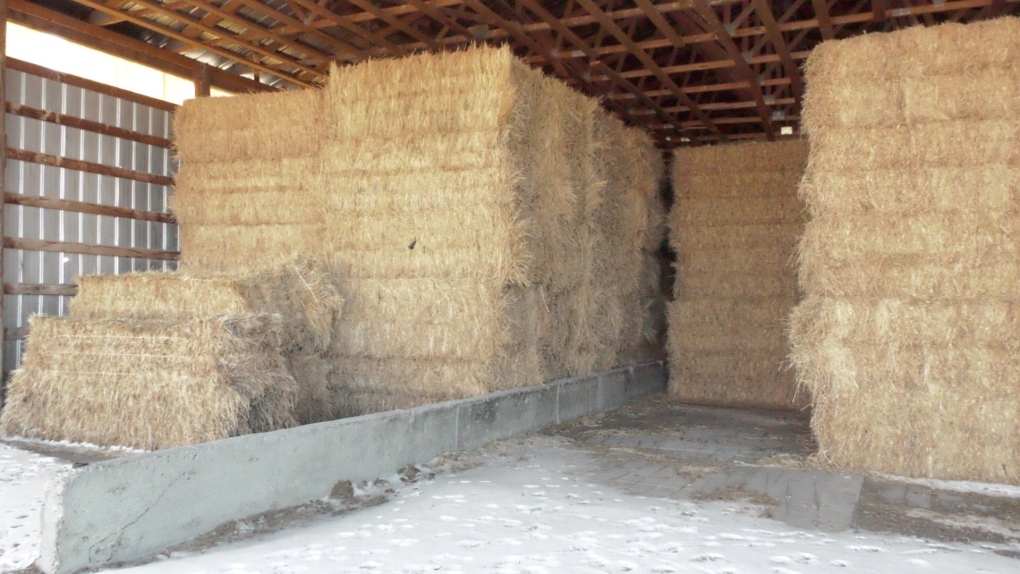'Be aware when you're buying hay': Online hay sale scams on the rise
 Recent years of drought have led to a shortage of hay and in turn has made farmers more desperate than ever for it. Scammers know this and have been taking full advantage.
Recent years of drought have led to a shortage of hay and in turn has made farmers more desperate than ever for it. Scammers know this and have been taking full advantage.
Last month when Eric Boot, owner of Boot Hay Farms, learned someone was impersonating his business online, he was surprised.
But then it began to make more sense.
"About a month ago, I got a call from a lady that was out of Vancouver Island and she mentioned that she had hay coming from our operation. It kind of puzzled me because I knew we hadn't done any business there," Boot said.
"And she proceeded to explain she'd seen it on Facebook."
The woman made a down payment of $800 before receiving multiple calls asking for more money.
Once she got suspicious, she reached out to the real Boot Hay Farms and discovered she'd been scammed.
Recently, the Redcliff RCMP put out an alert for a similar scam happening in the Medicine Hat and Cypress county area.
A Facebook user by the name of "Maxwell Jakes" had been posting ads to Facebook saying they have bales of hay and straw available.
But once the buyer sends money through an e-transfer, no hay is ever delivered.
"It seems to be ramping up in the last year or two, especially with the use of the internet and people being able to transfer money electronically."
Recent years of drought have led to a shortage of hay and in turn has made farmers more desperate than ever for it.
Scammers know this and have been taking full advantage.
"I guess there's always a certain amount of it that happens every year and people have to be aware when you're buying hay or even selling hay … (of) people not delivering the hay after getting paid," said Lynn Jacobson, Alberta Federation of Agriculture president.
With the ongoing shortage, there's no telling just how long these scams will continue.
Farmers and anyone else buying hay will have to be cautious with any business they do online.
Simple things like only dealing with people you know and not paying for the hay until it's on your property can help lessen the risk of being scammed.
"There's common sense things that people can do. And one of the things is you want to inspect that hay and you want to have it on your yard before you make payments," Jacobson said.
If you have been scammed in an online hay sale or have any information about a scam, you can contact the RCMP or Crime Stoppers.
CTVNews.ca Top Stories

B.C. seeks ban on public drug use, dialing back decriminalization
The B.C. NDP has asked the federal government to recriminalize public drug use, marking a major shift in the province's approach to addressing the deadly overdose crisis.
Orca calf that was trapped in B.C. lagoon for weeks swims free
An orca whale calf that has been stranded in a B.C. lagoon for weeks after her pregnant mother died swam out on her own early Friday morning.
Trump's lawyers try to discredit testimony of prosecution's first witness in hush money trial
Donald Trump's defence team attacked the credibility Friday of the prosecution's first witness in his hush money case, seeking to discredit testimony detailing a scheme between Trump and a tabloid to bury negative stories to protect the Republican's 2016 presidential campaign.
Sophie Gregoire Trudeau on navigating post-political life, co-parenting and freedom
Sophie Gregoire Trudeau says there is 'still so much love' between her and Prime Minister Justin Trudeau, as they navigate their post-separation relationship co-parenting their three children.
Air traveller complaints to Canadian Transportation Agency hit new high
The Canadian Transportation Agency has hit a record high of more than 71,000 complaints in a backlog. The quasi-judicial regulator and tribunal tasked with settling disputes between customers and the airlines says the backlog is growing because the number of incoming complaints keeps increasing.
More than 115 cases of eye damage reported in Ontario after solar eclipse
More than 115 people who viewed the solar eclipse in Ontario earlier this month experienced eye damage after the event, according to eye doctors in the province.
'I was scared': Ontario man's car repossessed after missing two repair loan payments
An Ontario man who took out a loan to pay for auto repairs said his car was repossessed after he missed two payments.
76ers All-Star centre Joel Embiid says he has Bell's palsy
Philadelphia 76ers All-Star centre Joel Embiid has been diagnosed with Bell’s palsy, a form of facial paralysis he says has affected him since before the play-in tournament.
U.S. flight attendant indicted in attempt to record teen girl in airplane bathroom
An American Airlines flight attendant was indicted Thursday after authorities said he tried to secretly record video of a 14-year-old girl using an airplane bathroom last September.






























